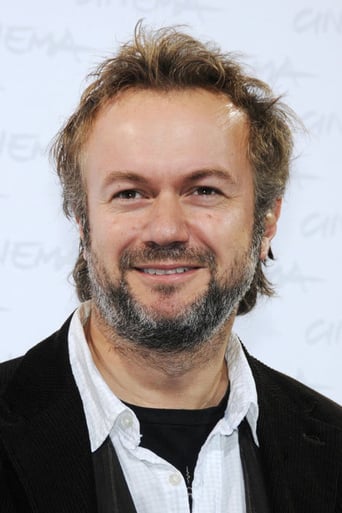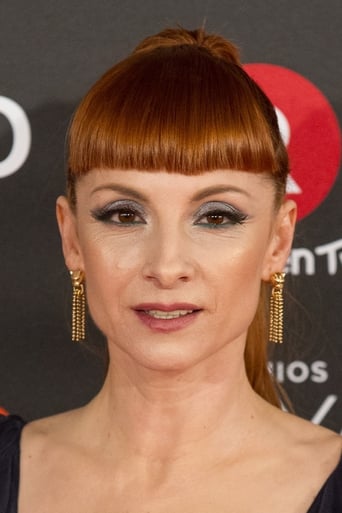moose moose
This movie started poorly and just got worse. The story was weak, the characters were shallow and poorly developed, the writing was not strong and the acting was mediocre. Each plot and sub-plot was washed out and uninteresting, it was convoluted, messy and there were continuity errors or maybe, in the mind of the director, they were 'devices' - in any case the story development was poorly executed. The way the story was knitted together using tricks and gimmicks where nothing is quite explained and the narration and dialogue is in riddles... very juvenile and poorly conceived, maudlin and misguided. The relationship between the leads was also not believable, probably in large part due to the fact that the Lorenzo character was a miscast. I would give it a 0 but can't because I couldn't finish it (very rare for me) and so it wouldn't be fair to give a full 0. Also, some of the cinematography was nice (albeit gimmicky at times) and Ana Vargas was very hot earning modest points, but overall an abject failure and waste of time.
JC VD
For a north American who usually watches N.A. candy like movies, which are usually visually pleasing but hollow in the script, this one is a very nice surprise.I'll give a 10/10 for the movie - script, director's performance, cinematic effects, castings (kudos to Elena Anya - she should shoot more serious movies like this one than Hollywood movies like Van Helsing), editing. The sex scenes are explicit but necessary to tell the story honestly, so it's sex scenes in good tastes. p.s. Vicky Cristina Barcelona seemed to be a N.A. version of this one but like suggested earlier before, this movie got more complexity, originality & layers - thus more enjoyable.
Graham Greene
Without meaning to sound crass, Sex and Lucia (2001) is essentially a film, both literally and figuratively, about holes. We can look at and interpret these various holes in number different ways, be it in the more obvious creation of the cavernous dents that litter the film's expressionistic landscape, or instead, as metaphorical places for the characters to hide. On top of this we also have the holes as a sexual metaphor; with the sub-textual references to Alice's Adventures in Wonderland and the various thematic ideologies that such a notion presents, with the central character falling into a hole and being re-born into her own story; while later in the film, the male protagonist disappears into a hole and never returns. We also have the more erotic notion of the hole, as illustrated by the holes on the beach surround the obvious, phallic-like light-house.Here however, director Julio Medem is more concerned with how these holes in both the design of the film and its structure can be used as a means of navigating the audience through his various interweaving strands of character, narrative and the potential for multiple thematic outcomes. With this in mind, Sex and Lucia becomes less of a film in the conventional sense and more of a detective story for the audience to follow; existing in the same self-reflexive, psychological realm as Medem's other great features, such as Vacas (1991), The Red Squirrel (1993) and The Lovers of the Arctic Circle (1998), which each present similar ideas pertaining to the creation of a particular character and the world in which they inhabit. With Sex and Lucia however, we have alongside this titular character a handful of secondary characters that drift in and out of the film to supply clues before disappearing without a trace. To add further elements of confusion, paradox and open-ended interpretation, Medem skilfully juggles these characters between each varying strand, culminating in several possible stories each being woven simultaneously, but all leading back to the idea of the writer and the story that he (or she) is creating.It isn't as confusing as the interpretation would suggest, with the film rewarding patient and imaginative viewers with something that could be described as anything from a grand mystery, a cinematic enigma or a multi-layered riddle, wherein the stories are given the room to weave in and out of one another, creating windows that lead into dreams and everything is in some way connected. For anyone familiar with Medem's previous work it is clear that some elements of the plot are supposed to remain indecipherable. The director wants us to go back and re-experience the film like we would a novel; each time picking up subtle nuggets of information we may have missed the first time around. It is important to remember when watching Sex and Lucia that we are dealing - as stated above - not with a single story, but with several or more stories each being spun concurrently. When we begin to look at the internal logic of the story we see the fracturing of two separate elements. To better understand the film we must look at the plot, not from the point of view of Lucia, but from the perspective of the writer, noting how each of his sub-plots come to reflect the main elements of the story.So, we have a writer submitting a book about a couple's sensual holiday and eventual one-night stand. We then have the characters from that book losing touch, getting on with their lives, discovering the existence of a baby and eventually trying to track-each other down. Then we have the writer trying to write a novel about the new woman in his life. This book has none of the tragedy of the former, instead dwelling on love and sexual elation. Unsatisfied with this, the writer then begins to draw parallels with this story and the previous one, by re-introducing characters and adding a subplot of infidelity; all of which will climax on the island where the original story began. So there we have three novels within the film each being read, written or re-interpreted and each of them coming to reflect an element of Medem's film. Throughout the film the writer relates his story to various people; at one point even explicitly mentioning the hole in the middle that leads back into the story and the central idea behind the film. It is at this point that Medem begins incorporating narrative elements from the couple's gossipy conversation on the bench, the child's bedtime story, the internet relationship, the suicide note and finally, a central character's coma-induced fantasies. There are also some wonderful examples of character doubling, coupling and mirroring between the leads, which recalls the similarly complex experiments of Jacques Rivette's Celine & Julie Go Boating (1972) and is also Buñuelian almost in its execution.Medem's stylistic touches make the film all the more deceptive; creating a wonderful, alien landscape for his characters to interact with. As well as this, we also have an exceptional use of cinematography, where the camera is always mobile: circling, tracking, blocking, revealing; really becoming one with the characters and bringing us into both the fun and frivolity as well as the mystery. The editing works in as similar fashion, with Medem keeping the structure tight and rhythmic as he merrily jump cuts from one thing to the next, but always keeping the separate elements connected. Though some will obviously be put off by the explicit scenes of sexuality and the bold experiments with plot and character, for me, this is really a remarkable piece of cinema; one in which the literal plot holes are there to be explored, especially if we want to fully understand the film's gloriously tangled narrative and ambiguous shifts in time and place.









